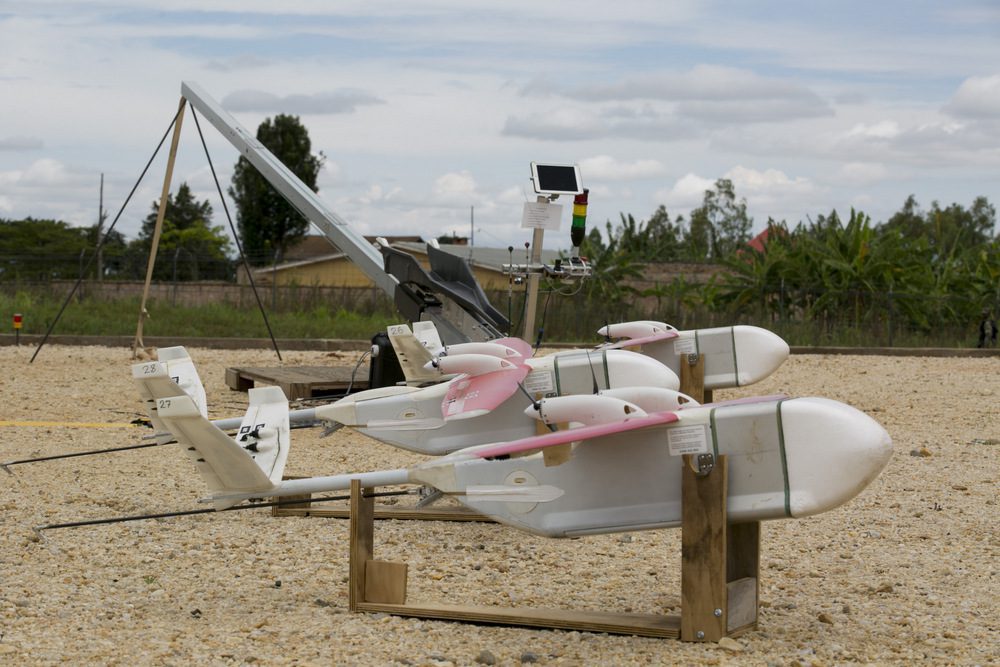Rwanda has successfully launched its first unmanned aerial vehicle (UAV) or drone to deliver supplies of blood quickly in remote rural hospitals that have been struggling for timely access to transfusion services.
Local community in Nyabihu, a mountainous district located in the western Rwanda watched with excitement as the drone, the first of is kind, was flying over in the sky, to release blood products in the neighboring shyira hospital.
“we were not sure what was about, but it was an amazing impression to see the aircraft with a massive zipper unzipping, flying over and over before dropping packages in the backyard of the hospital,” says Therese Mukashyaka, a female farmer from Vunga, a commercial rural center in Nyabihu district.
The first of its kind in the country, Rwandan has adopted this innovative technology as part of national efforts to create a high-quality national blood service.
Today the National Centre for Blood Transfusion (NCBT) provides safe and ample blood and blood products to all patients in need using this drone technology called ‘Zipline’ which cuts blood delivery times down from four hours to just 15 minutes in some cases.
Rwandan minister of Health, Dr Diane Gashumba explained that before the new technology was introduced in 2016, the country was relying on some 541 permanent mobile blood collection sites and five regional distribution centres serving 66 transfusing health facilities across the country.
“Saving lives is critical and thanks to the new technology we managed to establish a centralized supply chains and on-demand deliveries to reduce waste and stock shortages,” she said.
Rwandan government together with the manufacturer — zipline, one of the the Silicon Valley company that delivers essential medical products by drone,— hope this innovation will help solve logistical problems in several remote rural health facilities.
The drones are said to be able to cross long distances at faster speeds to deliver blood products and lab samples also is a huge benefit.
For example, when a patient comes in needing a transfusion, a doctor or healthcare staff sends a WhatsApp message or logs into Zipline’s ordering site to place an order.
Rwandan health official believe that the main advantage of this technology is about providing easy distribution of medical supplies to remote rural regions in a mountainous country which has approximately 25% of its 4,700km of the paved roads network.
Yet, Zipline says that it provides a seamless delivery system at an affordable price, the purchasing costs could be a hindrance as each drone costs about $7,000 USD.
But some local business operators in drone technology are convinced that the benefits of this technology extends well beyond just these costs.
According to Mamy Muziga Ingabire, the Managing director of Charis UAS, one of the drone company operating in Rwanda, the most important aspect with drones is to look at how using them and what types of solutions they can provide.
“Rwanda’s leadership and policies have been very supportive of innovative technologies and So we are grateful to our government for giving us the opportunity to introduce drone technology in the
country,” she said.
In the meanwhile Zipline’s Head of National Implementation, Israel Bimpe has confirmed the company was due to establish a drone assembling and maintenance plant in the country shortly.
“The ability to manufacture drones on site will enable Zipline to ramp up their delivery service to more hospitals,” he said.
So far officials’ reports indicate that drones have been delivering urgent medicines, mainly blood to 19 hospitals across Rwanda.
In addition, the firm using drones delivers blood medical supplies to 21 health facilities in the western part of the country, which were most affected by the logistics challenges.
But local community in Nyabihu district in western Rwanda say blood transfusion is no longer a main issue in local health facilities. “The issue of long-distance supply has been resolved thanks to these drones”
CU/abj/APA


